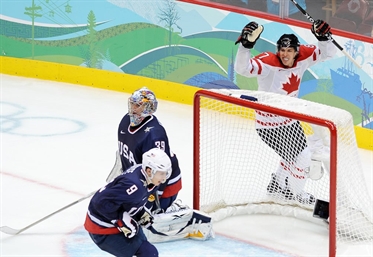Is 3 out of 5 possible?
Is 3 out of 5 possible?
Russia has the pressure – Canada the gold?

 His biggest goal: Canadian forward Sidney Crosby celebrates after scoring the game-winner in the 2010 Olympics’ gold medal game against the U.S. Photo: Matthew Manor / HHOF-IIHF Images
His biggest goal: Canadian forward Sidney Crosby celebrates after scoring the game-winner in the 2010 Olympics’ gold medal game against the U.S. Photo: Matthew Manor / HHOF-IIHF Images
Playing on home ice at only the second Olympic Winter Games hosted by Canada, and following the nation’s worst Olympic showing four years previous in Turin, the Canadians faced the daunting task of having to live up to expectations succinctly described by COO John Furlong: Canadians would give up all Olympic medals for only one, the one they cherished most – gold in men’s hockey.
Executive director Steve Yzerman did his part. Coach Mike Babcock did his part. Sidney Crosby scored the golden goal, and Canada did, indeed, win the coveted gold. Phew!
Four years later, it’s safe to say the Russians face a similar pressure and scrutiny. Can Ovechkin, Malkin, and Kovalchuk deliver? We’ll find out, but in the meantime, Canada flies into Sochi a much more relaxed group than four years ago. Of course, the pressure is still on to win, and Canada surely is, at worst, co-favourites, but it’s the hosts that have the greater psychological challenge.
Is this good or bad for Canada? Babcock once said that the best solution for pressure is preparation, and you know he is as prepared as any coach. The team has Crosby as captain playing at the very height of his powers, and his teammates look to be an even stronger group than in Vancouver.
“The process was really good because we had [head coach] Mike Babcock there,” executive director Steve Yzerman noted of the process for choosing the 25 players to go to Sochi. “Mike came in and told us, if you’re in the last minute of a game, and you’re up by a goal, you need two groups – who’s going to take the face-off on the right-hand side and he came up with some names. How are you going to use these guys? Mike and his staff had a lot of discussions on the power play, the penalty kill, and the last minute of games.”
Continue readingThe final selections produced many expected names and a few surprises – both for who was on the team... and who was not. The only weakness, where the choices were few and far between, was in goal.
Canada’s three goalies are Roberto Luongo, Carey Price, and Mike Smith. Here’s the problem. In 2002, when Curtis Joseph had a bad game, Martin Brodeur came in and led the team to gold. In 2010, when Brodeur had a bad game, Luongo came in and, well, didn’t play that well but Canada still won.
What if Luongo doesn’t play well? Price and Smith are fine goalies but neither have Olympic experience and not much international experience. Price played at the 2005 U18 and the 2007 U20 and hasn’t seen an international sheet of ice since. Smith, a late bloomer, played at the World Championship last year, but that was his first and only experience playing for his country.
Given Luongo’s shaky play of four years ago and his inexperienced backups, this is likely the only weak link on an otherwise stacked Canadian team.
On defence, Canada has three returnees from Vancouver – Duncan Keith, Shea Weber, and Drew Doughty. Joining them are Dan Hamhuis, who has played in five World Championships, and the revived Jay Bouwmeester, who has gobs of international experience (four WM, 2006 Olympics, 2004 World Cup). They’re joined by Alex Pietrangelo, P.K. Subban, and Marc-Edouard Vlasic, who have less experience but have been impressive so far this 2013-14 NHL season.
“Speed and an unbelievable back end that can transport the puck and get it going in a hurry,” was how Babcock described the eight members of the blue line corps.
Up front, Canada boasts the ultimate troika of skill, leadership, and experience, but perhaps first and foremost is their proven ability to play on the bigger ice. Apart from Crosby, other returnees from Vancouver include Rick Nash, Ryan Getzlaf, Jonathan Toews, Corey Perry, Patrice Bergeron, and Patrick Marleau.
The newcomers can be grouped into two: those who were expected to be named, and those who may have been a bit of a surprise. Jeff Carter has been sensational this year but was still a debated choice when the roster was announced. John Tavares not only had a sensational junior career, winning gold in 2008 and 2009, he played at the 2010, 2011, and 2012 World Championships and has blossomed into a superstar with the New York Islanders. Matt Duchene, who just turned 23, is one of the NHL’s top young stars and has played at three of the last four World Championships as well.
And, of course, Steve Stamkos, who is among the most talented of pure goal scorers of the 21st century.
Stamkos, however, is one of the wild cards on the team, and not just because he’s injured. After breaking his leg early in the season, he has made a remarkable recovery and is doing everything possible to be ready to play. But if he plays in the NHL only once or twice – or not at all – before Sochi, will he be ready to contribute to the team? As Yzerman said – and no one would argue – if he’s healthy, Stamkos is one of the best players in the world. Period.
But if he isn’t, is his recuperation a distraction? And will his last-minute replacement, if it comes to that, be mentally prepared to step in? Naming an injured player to the team and hoping he’ll be ready is a gamble, especially in Canada where Yzerman had many healthy and available options to choose from – Martin St-Louis, Claude Giroux and Eric Staal are among the forwards who didn’t make the team.
Yzerman also named Chris Kunitz to the team and made clear that although Kunitz is a star wingman for Crosby, he got to the team of his own accord.
“A lot of people have asked me if Kunitz is being helped by Sidney Crosby,” Yzerman admitted. “They help each other. Chris has been an outstanding player throughout his career. He played for me in the 2008 World Championship. He’s virtually been in the playoffs every year, so we haven’t had the opportunity to bring him to any other World Championships.”
As assistant GM Ken Holland noted: “Knowing Mike Babcock, pairs like that could be split up by the halfway mark of the first period. Look at [defencemen] Seabrook and Keith in Vancouver. They didn’t even play together there.”
Jamie Benn of the Dallas Stars is also perhaps a surprise, but he’s played well with the Dallas Stars and is among the top scorers this season. Ditto for Chicago’s Patrick Sharp, who plays in the shadows of Toews and Team USA forward Patrick Kane with the Chicago Blackhawks, but who is an offensive force and expected to use his skating to greater effect on the big ice.
For Yzerman, speed and skill are the names of the game, and what worked in Vancouver isn’t necessarily going to work in Sochi.
“We tried to choose a team with a really high hockey IQ, one that’s ultra competitive and lightning fast,” Babcock described. “Lots of goals up front, people with the ability to play both ways,” he said. “Did I mention speed? Speed.”
Projected Result:
Only six countries have ever won Olympic gold in ice hockey – Canada, Great Britain, the Soviet Union/CIS, the United States, Sweden and the Czech Republic. The U.S. has never won outside its own borders. The Czechs have won only once and are not nearly the team they were in 1998. Russia is notorious for playing some of its worst hockey on home ice. Canada is loaded with talent and the defending champions. There is little to suggest it can’t win again in Sochi.
Top-3 Players:
Sidney Crosby: The most imaginative player in the game who can pass or shoot with equal effectiveness, this is Crosby’s hour. 27 years old, he is in his prime and playing accordingly.
Shea Weber: The man with a frightful slapshot, Weber is part Pronger, part Niedermayer. He’ll bring leadership to the dressing room and a point shot to the power play that will give Canada an extra dimension from the blue line.
Jonathan Toews: The youngest member of the Triple Gold Club, Toews has never met a pressure situation he didn’t like. Playing behind Crosby will be a perfect scenario for him to contribute as a scorer, two-way player, faceoff specialist, and leader.
Dark Horse:
Carey Price: It’s simple. In the four previous Olympics with NHL participation, Canada relied on one goaltender the whole tournament on two occasions—1998 (4th place) and 2006 (7th place) – and switched goalies during the tournament two other times – 2002 (gold) and 2010 (gold). Luongo is a goalie who can be spectacular – and one equally who can let in a devastatingly bad goal. Canada needs a second goalie, and if Price can make the most of his chance, it might make a golden difference.
Back to Overview











































